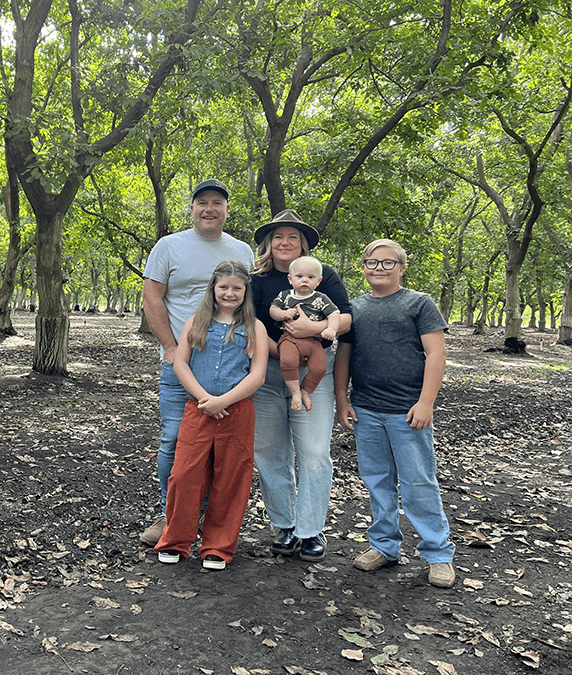
Kaben and Jenn Kramer make a living off something Jenn is allergic to. The Kramer’s grow walnuts in Butte County, but it was Jenn’s allergy to the tree nut that spawned a business idea. In came sprouted walnuts, a result of soaking raw walnuts in water to the point of germination, which in turn produces a milder tasting nut and reduces allergens by lowering the phytic acids and tannins.
According to the Kramers, four out of five people who are allergic to walnuts can consume sprouted walnuts safely. While the Kramers don’t make any claim to be doctors and don’t recommend anyone with severe allergies consume sprouted walnuts, Jenn, who eats sprouted walnuts herself, is proof of the theory.
The Kramers own and operate Tenderlyrooted in Biggs, Calif. They market sprouted walnuts as an ideal snack, shipping subscription boxes and à la carte packages to loyal customers in all 50 states. Kaben, a fourth-generation grower, didn’t plan to come back to the family farm after college and setting off on a different career path, but said the time away gave he and Jenn a fresh set of eyes and led to some interesting innovation.
During a time when COVID-19 and then a downturn in the walnut market was making life difficult for growers, sprouted walnuts were a beacon of hope. Seeing less and less of a future in the traditional way of selling walnuts and realizing that diversification was going to be key, the Kramer’s decided they wanted to become price setters instead of price takers.
“We said we wanted to start some side thing where we try to make money like a normal business would, rather than on the commodity market,” Jenn Kramer said.
They set aside just 1% of their crop to test the sprouted walnut idea in 2019. Now, 10% of their crop goes to producing the farm-to-consumer snack. As they delved deeper into why more American’s aren’t eating walnuts, they realized their product could provide a different experience for a consumer who might not normally choose walnuts as a snack.
“We have got to get walnuts out of the baking aisle and into the snacking aisle,” Kaben Kramer said.
They describe sprouted walnuts, which don’t look any different from regular walnuts, as being less bitter tasting, with a mildly creamy, buttery flavor profile. There are also some added health benefits, with sprouted walnuts opening up nutrient chains that help the body absorb a higher percent of the nutritional value of a walnut, Kaben explained. And since sprouted walnuts aren’t heated in the same way as traditionally processed walnuts, the amino acids and vitamins are also preserved.
“You’re getting all the perks and benefits of a raw food, you’re getting the perks of removing the antinutrients that make it harder on our system, and the tannins are what leads to the bitter taste of walnuts,” he said.
From Farmers to Marketers
The Kramer’s say the biggest obstacle to jumping into their sprouted walnut dream was having to shift their own mindsets while realizing they also had to shift the consumer mindset. Addressing specific customer pain points marked a significant change in how they perceived their product and its market. Along with overcoming typical new business challenges like developing a scalable e-commerce platform and pinpointing effective marketing strategies, making the strategic shift from being price takers to price setters, involved proactively locating and engaging with customers in their existing spaces and delivering products they desired directly to them.
“That was a significant shift in the way we approached what it means to be someone who produces something of value on an open market,” Kaben Kramer said.
Shifting to a direct-to-consumer marketing mindset with a product that many consumers have probably never heard of meant giving their customers something others couldn’t: a link to the people who grew it.
“People love Amazon because it’s cheap and its quick, but people also really care about where their food comes from, so how do you bridge those two?” Jenn Kramer said. “We ship literally twice a week from our farm to your door, year-round, 52 weeks a year.”
Other aspects of their marketing strategy included learning how to effectively promote themselves.
“We did a lot of reading and research because we were motivated, we knew we had a phenomenal product and we knew we had a beautiful answer to walnuts in America, instead of just exporting all of our nuts overseas,” Jenn Kramer said.
One of their most powerful marketing tools early on was social media, both in telling their story in an authentic and vulnerable way to their followers and by utilizing the power of influencers to share honest reviews with their own followers. That meant shipping their products out all over the country with no ask or obligation. It paid off when they found a ‘Holy Grail’ in influencer Sharon McMahon of Sharon Says So.
“She has over a million followers; at that time, she had a few hundred thousand,” Kaben Kramer said. “She really shared our product, and we saw a huge increase.”
But there’s also something to be said for the power of great packaging, he said, with their goal being for Tenderlyrooted products to stand as an equal on grocery store shelves with the largest brands in the country.
“We want someone to walk in and not know necessarily that it comes from a small farm; we want them simply to know that it’s a darn good product they want to buy over and over again,” he said. “Then it’s a fun surprise for them to realize how connected they are to their food source.”
He also said success is easier achieved by investing in tools that foster trust and accessibility for the consumer that ensure quick and secure transactions when making a purchase.
“We found we win way more customers when we step into what every other major brand is doing,” Kaben Kramer said. “Just removing one click through the process increases conversion so much. As farmers, we’re not used to thinking this way.”
A Reward Worth the Risk
While just 10% of their annual crop is held back for sprouted walnuts, it’s the one thing that has kept the Kramer’s afloat in uncertain times.
“Without a doubt, sprouted walnuts have saved the farm two years in a row now,” Kaben Kramer said. “We think sprouted walnuts are the answer on so many levels. It doesn’t take hard mental math to realize that this is a place that people should be investing their energy.”
As the Kramer’s are pioneering the sprouted walnut movement, they hope it will eventually grow beyond a niche, with more growers joining them. They propose that by withholding 2% of a crop and focusing on effective marketing and branding, other growers could boost their bottom-line revenue by 10% with a similar direct-to-consumer product; they just have to be willing to take the risk.
“We’ve learned a lot through a lot of mistakes, and we would love to share our expertise with other people,” Kaben Kramer said.
The Kramer’s believe success in this space hinges on being open-minded, curious and sensitive to customer needs while building on what you’re already good at.
“Our advice to people would be to start small and do it in parallel to what you’re already doing,” Jenn Kramer said. “Don’t abandon what you’re already doing; the market will tell you.”










